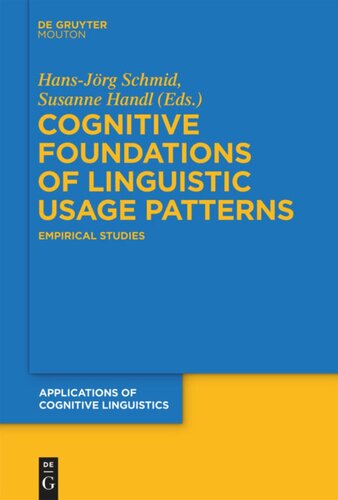

Most ebook files are in PDF format, so you can easily read them using various software such as Foxit Reader or directly on the Google Chrome browser.
Some ebook files are released by publishers in other formats such as .awz, .mobi, .epub, .fb2, etc. You may need to install specific software to read these formats on mobile/PC, such as Calibre.
Please read the tutorial at this link: https://ebookbell.com/faq
We offer FREE conversion to the popular formats you request; however, this may take some time. Therefore, right after payment, please email us, and we will try to provide the service as quickly as possible.
For some exceptional file formats or broken links (if any), please refrain from opening any disputes. Instead, email us first, and we will try to assist within a maximum of 6 hours.
EbookBell Team

4.1
80 reviewsThe volume presents an up-to-date collection of methodologically sensitive contributions providing mainly enthusiastic, at times also critical support for the cognitive-linguistic enterprise. The book is important for the advancement of cognitive linguistics because the contributions demonstrate the seriousness of its ambitions to develop into a set of testable linguistic approaches. For the same reason, the volume is a contribution to our understanding of language in general, since it puts a promising modern approach on firmer ground. Assets of the book include the wide range of linguistic phenomena studied (individual concepts, fundamental semantic problems like vagueness and polysemy, grammatical issues incl. gender and tense, collocations, constructions and speech acts) and the scope of applied perspectives including lexicographical, computational, developmental and critical discourse ones. The languages investigated are English, German, Dutch, Polish and Italian.
Common to the contributions is the desire to bring together observed patterns of linguistic usage with concepts and models established in cognitive linguistics. In addition, all contributions have an empirical basis and emphasize the need to rely on a sound methodology. The linguistic phenomena investigated span the range from the lexico-conceptual and collocational level to constructions, grammatical categories and functions.
Two complementary perspectives of language and cognition are represented in the volume: In one group, the established methods of psycholinguistic experimentation, quantitative corpus analysis and computational simulation are exploited to demonstrate the viability and to increase the plausibility of cognitive-linguistic thinking. The second group tests well-known cognitive-linguistic approaches like Conceptual Metaphor Theory, the Theory of Idealized Cognitive Models and Construction Grammar against authentic data demonstrating their applicability and explanatory potential. Both groups include contributions reaching beyond the scope of traditional cognitive-linguistic topics, e.g. by taking a critical stance of reductionist cognitive thinking.
The volume is of interest to cognitive linguists, psycholinguists, theoretical linguists, lexicologists, and lexicographers.